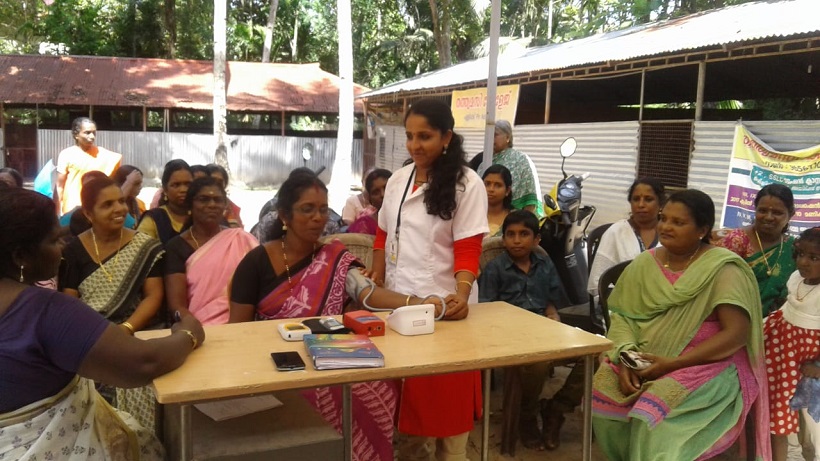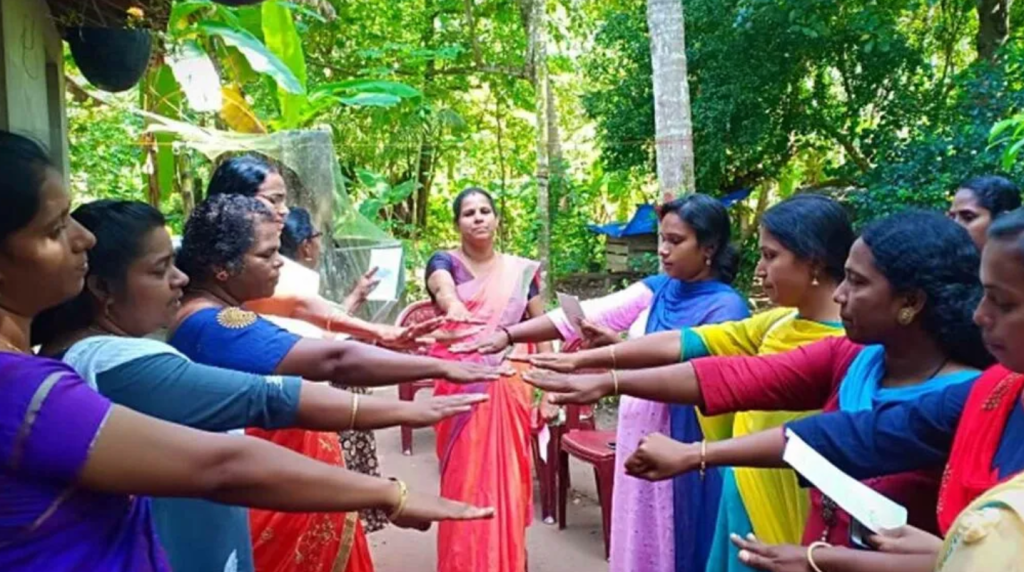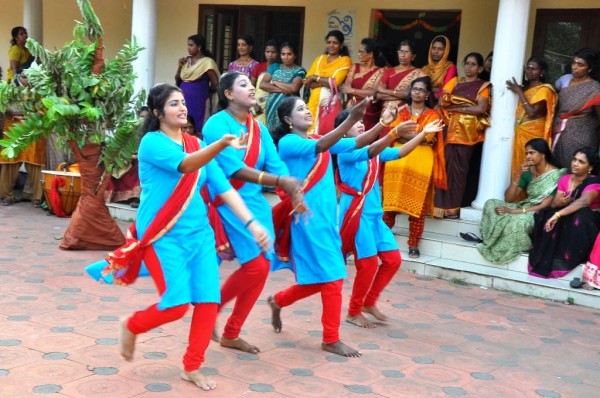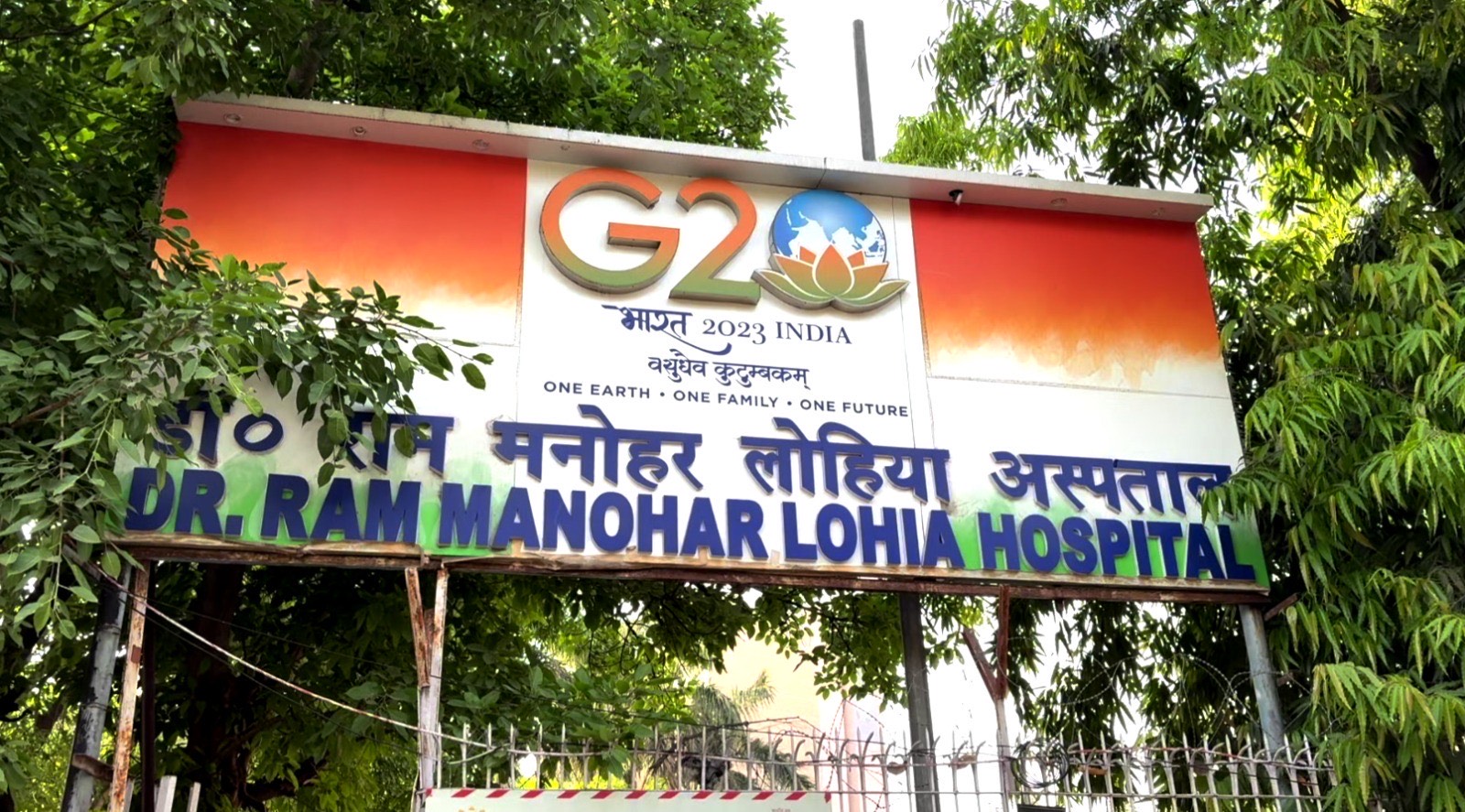In Kerala, Kudumbashree is frequently equated with women’s empowerment and financial independence. Launched in 1998 as a community network designed to collaborate with local self-government institutions (LSGIs) to eradicate poverty and empower women, Kudumbashree translates to “propensity of the family.” This programme is a combined effort between the Government of Kerala and the National Bank for Agriculture and Rural Development (NABARD), officially registered under the Travancore Cochin Literary, Scientific, and Charitable Societies Act (1955).
The women’s community network operates within a three-tier model, starting with Neighbourhood Groups (NHGs) at the grassroots level, Area Development Societies (ADS) at the intermediate level, and Community Development Societies (CDS) at the local government level.
Over its 26 years of operation, Kudumbashree has become a comprehensive organisation focused on local economic development and a participatory platform for women. All villages and municipalities have numerous Kudumbashree units. Their activities range from “economic empowerment” through initiatives like cooperative farming, livestock management, and market expansion; “social empowerment,” including the identification and support of destitute individuals and the rehabilitation of people with mental health disorders; and “women’s empowerment” through educational initiatives and programmes aimed at eliminating violence against women.
Microfinance and economic emancipation
‘My husband is chronically ill; Kudumbashree has played a big part in our lives,’ says Shanti (58) from Alappuzha. ‘The ayalkoottam (NHGs) here provide women like me with various opportunities. I work as a domestic worker. In addition to the income I earn from my work in homes, I am also able to make and save money through Kudumbashree. In our panchayat, we assist with the crops during the harvest season. Additionally, we plant vegetables on plots of land and sell the yields, dividing the profit among us. This organisation has been a great help for all of us. When we first started working as manual labourers, we were faced with ridicule and uncertainty.‘
She further says, ‘But we were not feeling dejected. This is important to us. My husband is a day labourer, but his sickness limits him. During months when he cannot work, the loan system is an added relief for me. I have been able to single handedly cover my husband’s medical expenses.’

Since its inception under the E K Nayanar-led government, microfinance has been at the heart of Kudumbashree’s missions for poverty eradication. Geetha (59), who oversees the finances of Kudumbashree in a panchayat in Alappuzha, explains, ‘Through its thrift and credit programme, Kudumbashree significantly improves the financial status of underprivileged women. Neighbourhood groups collect small, regular savings, which are then pooled and lent internally to members in need, helping them manage immediate financial shocks. The thrift and credit function is central to the Kudumbashree neighbourhood groups and is a key focus of their weekly meetings. We determine loan amounts and prioritise disbursements, with repayments collected during these meetings.’
‘Our bank linkage programme has enabled inclusive growth by providing easy access to bank loans without requiring physical collateral, thus preventing the poor from resorting to moneylenders. To encourage NHGs to engage with the bank linkage programme, Kudumbashree has introduced an incentive called the matching grant. NHG efficiency and effectiveness are assessed based on clear, objective criteria,’ adds Geetha.
Statewide, NHGs have amassed Rs. 8770.09 crore in thrift savings and issued internal loans totalling Rs. 27,505.59 crore, with comprehensive reports shared in monthly CDS meetings.
Initiatives of Neighbourhood Groups of the Kudumbashree Mission in Kerala
The Ayalkoottam forms the backbone of Kudumbashree, serving as the fundamental unit in the mission’s three-tier structure. Within these groups, participants undertake various microenterprises and welfare programmes, driving the core activities and initiatives of Kudumbashree. In the farming sector, Kudumbashree has crucially influenced marginalised women to actively engage in mainstream agriculture. This initiative has enhanced food security and provided these women with a reliable income source.

Through its efforts, Kudumbashree has established approximately 60,000 joint liability groups (JLGs) of women farmers across Kerala, collectively cultivating about 53,000 hectares of land and involving over 350,000 women in agricultural activities. Notably, these initiatives have encouraged a shift towards sustainable farming practices, positively impacting environmental conservation and local biodiversity preservation.
In the farming sector, Kudumbashree has crucially influenced marginalised women to actively engage in mainstream agriculture. This initiative has enhanced food security and provided these women with a reliable income source.
Sindhu (60), a Kudumbahsree member and sanitation worker in Kerala, comments on the many challenges of waste collection. ‘This is hard work. I feel like people tend to overlook the contribution we make to keeping the community clean. Kudumbashree’s Haritha Karma Sena programme has been essential in promoting environmental well-being. Through effective waste management and recycling, we contribute significantly to conservation efforts. Moreover, the programme has empowered women like me by providing a sense of purpose and a stable income, allowing us to support our families and improve our quality of life.’
‘This is also about recognition and solidarity,’ Shanti says. ‘We work collectively as a team. During festival seasons like Onam and Christmas, we sit together and make banana chips, plum cakes, pickles, rice balls, and jackfruit preserves to sell in the local markets. The stitching unit established at the back of our temple hall has provided us with not only an additional source of income but also a space where we can enjoy each other’s company and support one another.’
Neighbourhood Group meetings also serve as forums to discuss local issues that should be addressed in the Gram or Ward Sabha meetings of the local self-government. These groups are intended to collaborate with local self-government bodies in planning and implementing the developmental needs of the community. Through discussion, Neighbourhood Groups are encouraged to develop “micro-plans,” which local self-governing institutions should consider when formulating their own plans through broader public consultation.
This process has facilitated the implementation of MGNREGS (Mahatma Gandhi National Rural Employment Guarantee Scheme). The high female participation in MGNREGS is linked to the significant gender wage gap in Kerala, which, as reported in the MGNREGS Sameeksha (assessment) report, was the largest for casual wage labour in the state. In 2021, men earned Rs 205.21 more per day than women, with men averaging Rs 741.89 per day compared to women’s Rs 536.68. Typically, in regions with a pronounced gender pay gap, more women engage in MGNREGS because men often opt for better-paying jobs. Other influencing factors could include the lack of suitable work for women or cultural barriers that hinder women’s participation in the labour market.
Kudumbashree in 2024
In 2024, Kudumbashree, India’s largest self-help group, has evolved to incorporate novel initiatives to contribute to society. Plans are underway to launch ‘Happiness Centres’ as a new initiative under the National Rural Livelihood Mission’s FWHW (Food, Nutrition, Health, and WASH) program. This project will begin its initial phase in 168 model Community Development Societies throughout Kerala, with the goal of promoting holistic well-being and uplifting individuals and families by tackling various challenges across multiple areas. The initiative will include a survey in selected CDSs to develop a Kerala-specific index. Experts will oversee the implementation, integrating the project with existing Kudumbashree efforts and setting up strong monitoring systems at regular intervals.

According to a statement from the state’s Local Self Government Department (LSGD), the project’s goal is to “enhance overall happiness by addressing various challenges faced by individuals and families across domains such as equality, financial stability, mental health, nutrition, hygiene, democratic values, arts, sports, and literature.”
Kudumbashree also plays a major role in State’s official responses to natural disasters and calamities. Reflecting the remarkable confidence and resilience demonstrated during the crises of unprecedented floods and the COVID-19 pandemic, Kudumbashree women are now extending their support to the victims of the Wayanad landslides. They are managing Help Desks at various locations, including GHSS Meppadi, St. Joseph Higher Secondary School, and others, coordinating with local authorities and updating the control room at Meppadi Grama Panchayath.
Approximately 50 Haritha Karma Sena members are engaged in sanitation efforts at relief camps, while Kudumbashree is also providing psychological support through Community Counsellors from the Snehitha Gender Help Desk, who are assisting women and children. Over 450 Resource Persons from the FNHW (Food, Nutrition, Health, Water, and Sanitation) Project are offering various services across the camps, supported by around 30 Kudumbashree Executive Members and ADS Office Bearers.
As Kudumbashree continues to adapt and address emerging needs, its efforts remain a testament to the power of collective action and community-driven development. The organisation’s ongoing commitment to empowering women and supporting vulnerable populations stands as a model of effective and compassionate social intervention.
About the author(s)
Gayathri S (she/her) is currently pursuing her master's in English. With a deep-rooted love for literature and writing, she hopes to streamline her interests towards a career in journalism. Alongside her studies, Gayathri has gained practical experience through internships in content writing, editing, and research. These opportunities have strengthened her commitment to impactful storytelling and managing projects aligned with broader social goals. Gayathri looks forward to merging her passion for writing with journalism, where she can explore and report on diverse narratives.






Your blog is a breath of fresh air in the often stagnant world of online content. Your thoughtful analysis and insightful commentary never fail to leave a lasting impression. Thank you for sharing your wisdom with us.